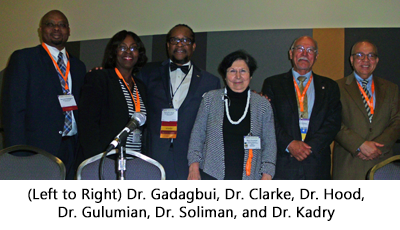
Africa is a unique continent, with unique peculiarities as well as unique challenges, and there was no better forum to engage in robust discourse on how to address the peculiar problems of Africa than the Informational Session “Management of Toxic Wastes in Africa: Challenges and Opportunities,” endorsed by the SOT Toxicologists of African Origin Special Interest Group (TAO SIG) during the SOT 57th Annual Meeting and ToxExpo. In attendance at the lively session was la crème de la crème of toxicologists of African origin, including Dr. Darryl Hood, Ohio State University; Dr. Bernard Gadagbui, University of Cincinnati; Dr. Abdel-Razak Kadry, US Environmental Protection Agency, Professor Austin Arukwe, Norwegian University of Science and Technology, amongst other heavyweight African scientists and participants.
 The curtain-raising duties of the session were taken by Dr. Salah Soliman, Alexandria University, Egypt, who spoke on “living in the vicinity of toxic waste dumping sites.” He decried, in very strong terms, the indiscriminate dumping of electronic wastes in Africa, thereby consigning the continent to being an “electronic graveyard.” Dr. Soliman pointed out that the presence of toxic chemicals, such as polybrominated diphenyl ethers (PDPE), perfluorooctane sulfonate (PFOS), and hexabromocyclododecane (HBCDD), in electronic wastes was a major public health concern, especially among the vulnerable population. Additionally, he stated that the exacerbated death rates arising from industrial- and agricultural-related causes could be traced to the more than 50,000 tons of obsolete pesticide stockpiles in Africa. Dr. Soliman specifically pointed out the two-decade strategy of eliminating the menace of lindane in Egypt, insisting that there must be stringent border control of prohibited chemicals and harmonization of pesticide registration in the African continent.
The curtain-raising duties of the session were taken by Dr. Salah Soliman, Alexandria University, Egypt, who spoke on “living in the vicinity of toxic waste dumping sites.” He decried, in very strong terms, the indiscriminate dumping of electronic wastes in Africa, thereby consigning the continent to being an “electronic graveyard.” Dr. Soliman pointed out that the presence of toxic chemicals, such as polybrominated diphenyl ethers (PDPE), perfluorooctane sulfonate (PFOS), and hexabromocyclododecane (HBCDD), in electronic wastes was a major public health concern, especially among the vulnerable population. Additionally, he stated that the exacerbated death rates arising from industrial- and agricultural-related causes could be traced to the more than 50,000 tons of obsolete pesticide stockpiles in Africa. Dr. Soliman specifically pointed out the two-decade strategy of eliminating the menace of lindane in Egypt, insisting that there must be stringent border control of prohibited chemicals and harmonization of pesticide registration in the African continent.
Dr. Mary Gulumian, University of Witwatersrand, South Africa, also took the stage to highlight the prevention and remediation approaches adopted by South Africa to solve the issue of water contamination arising from mining and industrial activities. She identified acid mine drainage (AMD) as the acute cause of water contamination in that country and highlighted different remediation and mitigation strategies. These included liming to improve alkalinity and neutralization of AMD using fly ash generated from local power stations, which are deliberately passive treatment systems that incorporate reduction of sulfates and toxic metals. Interestingly, the best remediation approach corroborated what we have always known: that green is good! This method is the deployment of organic materials to tackle AMD—Casuarina trees to the rescue!
The name Agbogbloshie may sound musical but the activities in this e-waste scrap yard are hardly sonorous for the health of man and the environment. In a highly stimulating presentation, Dr. Edith Clark, Ghana Health Service, showed the audience with sights and sounds of Agbogbloshie. A typical activity here is the breaking up and burning of e-wastes in order to recover copper wires and other recyclable products. With this comes the emission of noxious gases such as dioxins and furans. Consequently, a clinical study conducted on occupationally-exposed workers in the scrap yard was not exactly cheering. Elevated levels of deleterious elements were found in their blood and urine samples.
After an engaging Q&A session, Dr. Darryl Hood, the effervescent TAO SIG Vice President, shaped the consensus of all participants with the statement that “tight regulation must be put in place in the African continent to forestall making it a perennial e-graveyard.”
Synergy. Cooperation. Collaboration. These words also came up prominently in the discourse. The takeaway message was simple: Africans must join ranks to tackle the challenges facing the continent.
This blog was prepared by an SOT Reporter. SOT Reporters are SOT members who volunteer to write about sessions and events they attend during the SOT Annual Meeting and ToxExpo. If you are interested in participating in the SOT Reporter program in the future, please email SOT Communications Director Michelle Werts.